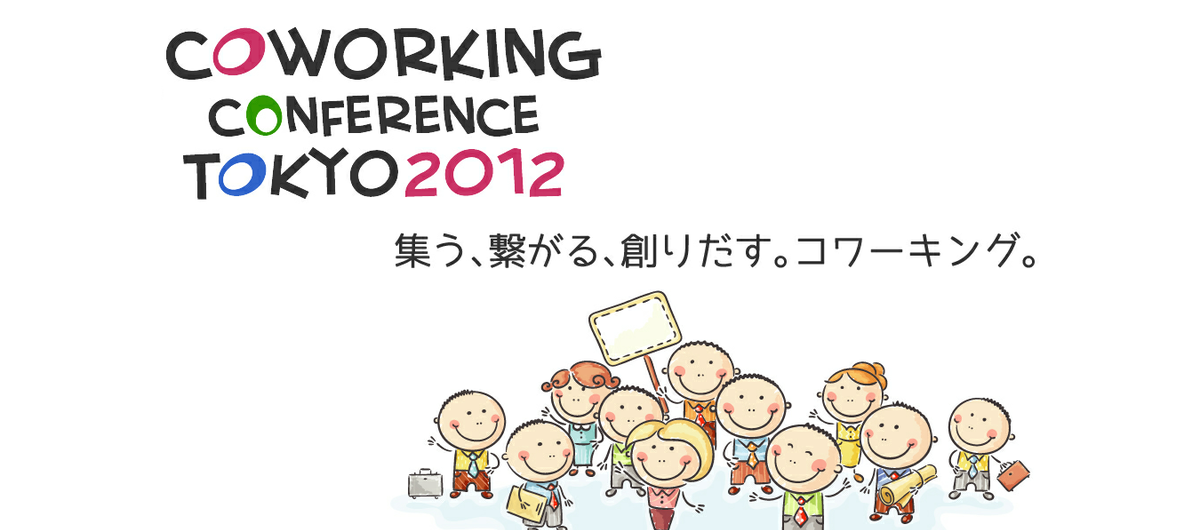Two years ago, coworking in Japan was quite unknown, with under five spaces in operation. Today, there are more than 70 coworking spaces, collaborative workspaces and Jelly venues, the majority found in the Japanese capital.
Growth has been so fast that a book has already been published on the subject, entitled Work to Party! Let’s Start Coworking (informal translation). Yutaka Fujiki, along with Kyo Satani and Ken-ichi Nakaya, co-wrote the book, hoping to share his experience as one of the longest-serving members of the coworking community in Japan. The book advocates the creative innovation that coworking begets, and explores the potential to transform both Japanese economy and society.
Fujiki will once more document the power of coworking, but this time at the Coworking Conference Tokyo, where he will handle a team of photographers and filmers. He hopes that, like his book, the conference will draw more attention to the movement and create a unity between the spaces.
‘I hope the conference will connect many coworking spaces (and make them) better places to meet and interact,’ he said. ‘Meet(ing) people is very important factor of coworking. It's not just only about finding a business partner, but also social interactions, a chance to influence each other and discover different perspectives for both business and lifestyle.’
These points though are only two of the ambitious aims of the Coworking Conference Tokyo.
Challenges to the Japanese coworking movement
Junji Jackie Yamakawa is the founder of ZEN Coworking and the director of the conference. Yamakawa is delighted at coworking’s trajectory in Japan, but feels there are some hurdles that coworking faces that are unique to the country.
“Unfortunately, this workstyle is difficult for Japanese people, because they are often shy,” he said. His opinions are shared by others. Kazunobu Ikagawa, founder of a coworking café and presenter at the conference, also feels that the coworking values are not harmonious with Japanese culture.
‘Many Japanese are poor at acting spontaneously. Japanese people need to get better, and quicker, at finding partners for projects, and implementing them together,’ he said. But he is optimistic that coworking is the remedy for this, helping to bring out an individual’s spontaneity.
Besides the cultural challenges, director Yamakawa feels that the rapidity of coworking’s expansion has caused a lack of unity between spaces.
“Each space is isolated and has had little direct contact with one another because coworking has expanded rapidly, (with most spaces) rushing to open only during the past year,” he said. “The conference aims to bring coworking space operators and interested parties together to solve these problems.” To address the above issues, the conference will adopt a different form to what we have seen in past event.
Conference-come-exhibition
Most notably, the program includes content which is relevant for current and potential coworkers. The first panel of the day, for example, will be an advice session from current coworkers to potential coworkers, designed to heighten awareness about the work trend and clarify what it means to cowork.
Furthermore, no less than 36 coworking spaces from around Japan will set up booths in an exhibition area. Attendees will have the opportunity to talk face-to-face with space owners from across the country about starting to cowork or opening a space.
The coworker-focus has swollen attendance numbers significantly, with an enormous 400 people expected to attend the event. But this exhibition hall will of course also help space operators to get to know one another, and is an exemplary demonstration of coworking’s collaboration and community-focus.
In addition, community strengthening measures have already gone underway in preparation for the conference, including the initiation of a Japanese coworking visa on May 16th, whose Facebook group already has over 100 members.
“We’re beginning to think that the Japanese coworking model is a possibility to solve many of Japan’s problems, such as the inequalities in society regarding academic background and careers. Coworking presents a fresh way to solve (these problems).”
Eager to tap into this potential, conference organisers have included a panel discussing coworking for women, and the different work and social roles that they play in society, making the conference the first to actively seek to solve broader societal issues.
Akira Matsuda, the chairman of the conference and one of the first coworking evangelists in Japan, is eager to see the conference realise these changes by showing people the potential of working within a community.
‘It would be a beginning of changing working style for Japanese people. I believe we can be more creative, and (through this,) we can make the world a better place to live in.’
To a healthy Japanese community
Logistically, coworking is well suited to Japan. With a buzzing entrepreneurial scene and a lack of space, shared offices are a natural solution. The challenge for Japanese coworking activists is to add the elements of community and collaboration, and thus make the transition from simple ‘shared office space’ to coworking.
Coworking conferences are a celebration of community, an ode to collaboration and a shout out to the rest of the world that sharing and exchange is the way forward. They have the potential to positively impact society by empowering individuals through community participation.
The Coworking Conference Tokyo presents an opening into the minds of people to explain, teach and share with them what coworking is about, and what it has the potential to achieve; and organisers of the event are making sure they exploit this opportunity for all it’s worth.








